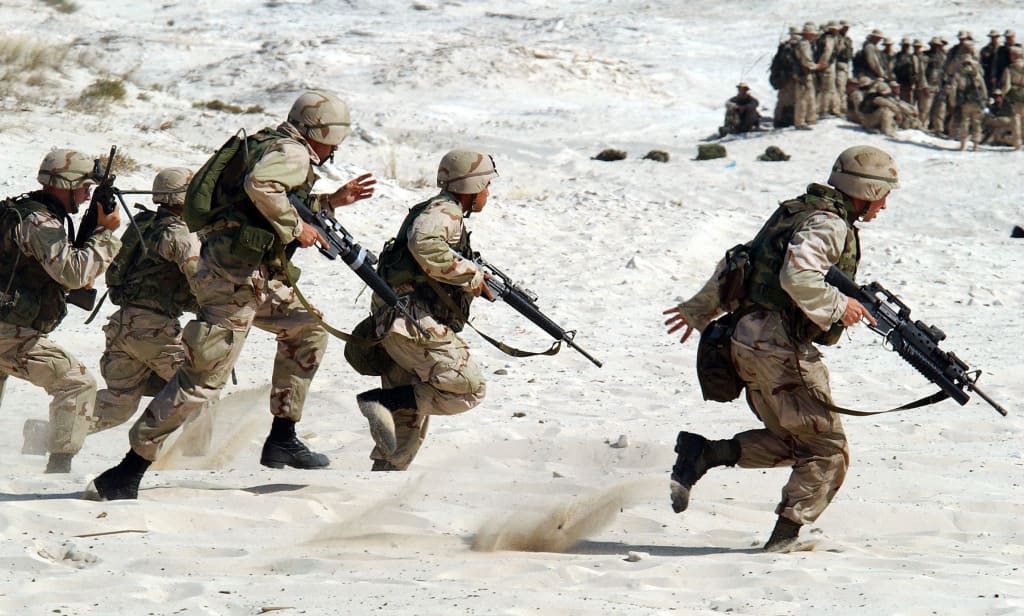The Middle East Conflict Saga
Unraveling Origins and the Perpetual Cycle of War

The Middle East, often referred to as the "cradle of civilization," has paradoxically also been a crucible of conflicts throughout history. The roots of the seemingly unending cycle of war in the region are deeply entrenched in historical, geopolitical, socio-cultural, and economic factors. Understanding these origins is essential to grapple with the prospect of persistent conflict in the Middle East. It's embedded in a mosaic of diverse cultures, languages, and tribal identities. While this diversity enriches the region, it also creates divisions that can be exploited for political gain.
The Middle East has a long history of conflict, often rooted in disputes over territory, resources, and power. The collapse of the Ottoman Empire after World War I and the subsequent arbitrary drawing of borders by colonial powers created lasting tensions and rivalries. This legacy has left a deep-seated sense of grievance and instability, which still reverberates in the region. The roots of the conflicts in the Middle East stretch across millennia, delving into the annals of ancient history.
This historically rich region has borne witness to the ebb and flow of empires, from the glorious days of Mesopotamia and the might of Persia to the grandeur of Rome, the Byzantine era, and the formidable Ottoman Empire. Each of these dominant forces has left behind a legacy of territorial disputes, intricate power struggles, and ingrained animosities, shaping the complex geopolitical landscape that persists to this day.
The strategic importance of the Middle East cannot be overstated. Rich in oil and gas reserves, the region holds immense geopolitical significance. Major powers, such as the United States, Russia, China, and European nations, have vied for influence and control in the region often supporting different factions or governments based on their interests.
External interventions by both regional and global powers have significantly impacted the region's stability. The influx of arms, military support, and interventionist policies have exacerbated existing conflicts and sowed the seeds for new ones. The proxy wars fought on Middle Eastern soil by outside powers further entrench the cycle of violence.

The Middle East is home to various religions and sects, including Islam, Christianity, and Judaism, with diverse interpretations and practices. Religious differences have often been exploited for political gain, resulting in sectarian conflicts. The Sunni-Shia divide, for example, has played a significant role in shaping regional conflicts, notably in Iraq, Syria, and Yemen.
Religion, notably Islam, plays a significant role in the Middle East's sociopolitical landscape. The region is home to diverse Islamic sects, particularly the Sunni and Shia branches. Historical tensions and modern-day power struggles have exacerbated sectarian divisions, turning religious differences into a driving force for conflicts. The ongoing tensions between Sunni-majority Saudi Arabia and Shia-majority Iran exemplify this struggle for regional dominance.
Long-standing and entrenched poverty, coupled with persistently high rates of unemployment, stark disparities in wealth distribution, and limited economic avenues, have been fundamental factors in fostering social discontent and political instability in the Middle East. It's important to recognize that these economic grievances possess the potential to rapidly escalate, transforming into civil unrest and rebellion, thereby exacerbating conflicts in the region.
Inadequate governance, autocratic regimes, corruption, and lack of political freedoms have led to widespread frustration and dissent among populations. As governments fail to address the needs and aspirations of their citizens, social and political unrest often erupts into conflict.
Deep-rooted historical grievances, stemming from a history of colonial oppression, ancient territorial disputes, and religious differences, persistently fan the flames of animosity among diverse communities in the Middle East. These deeply ingrained grudges, carried over generations, nurture an environment conducive to sustained conflicts and acts of violence driven by a thirst for revenge. The complex tapestry of historical tensions further complicates the prospects for lasting peace in the region.

The persistent cycle of war in the Middle East is the culmination of centuries-old conflicts, geopolitical power struggles, ethnic and religious tensions, economic disparities, and external interventions. While the prospects for perpetual peace may seem daunting, it is imperative for nations and international bodies to address these multifaceted issues collaboratively. A concerted effort that emphasizes diplomacy, inclusive governance, socio-economic development, cultural understanding, and conflict resolution is essential to break the cycle of violence and guide the Middle East towards a more stable and harmonious future.
About the Creator
Gale Mills
Unique stories from an imagined perception. Allow me to feed your brain.





Comments
There are no comments for this story
Be the first to respond and start the conversation.